Comprehensive Guide to Garden Maintenance in Plaistow
Introduction to Garden Maintenance
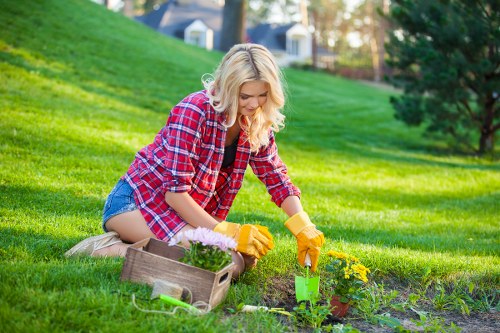
Maintaining a beautiful garden in Plaistow requires dedication, knowledge, and the right strategies. Whether you are a seasoned gardener or a beginner, understanding the essentials of garden maintenance can transform your outdoor space into a vibrant and thriving environment.
Garden maintenance involves a variety of tasks, including planting, pruning, weeding, and regular upkeep to ensure the health and beauty of your plants. In Plaistow, the local climate and soil conditions play a significant role in determining the best practices for garden care.
By following a structured maintenance schedule and utilizing local resources, you can achieve a lush and sustainable garden that enhances your property's aesthetic appeal and provides a peaceful retreat.
Understanding Plaistow’s Climate and Soil
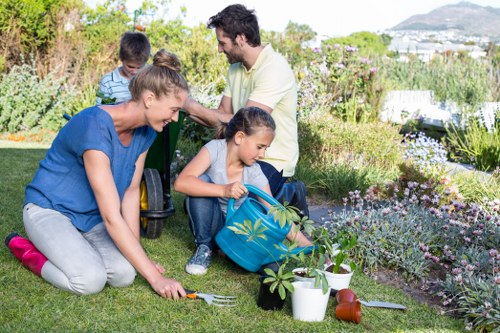
Plaistow experiences a temperate climate with moderate rainfall throughout the year, making it conducive for a wide variety of plants. The region typically has mild winters and warm summers, allowing for an extended growing season.
The soil in Plaistow is generally fertile, comprising a mixture of clay and loam. However, it's essential to conduct a soil test to determine pH levels and nutrient content. This information is crucial for selecting appropriate plants and determining necessary soil amendments.
Proper soil preparation, including aeration and the addition of organic matter, can significantly enhance plant growth and resilience against pests and diseases.
Essential Garden Maintenance Tasks
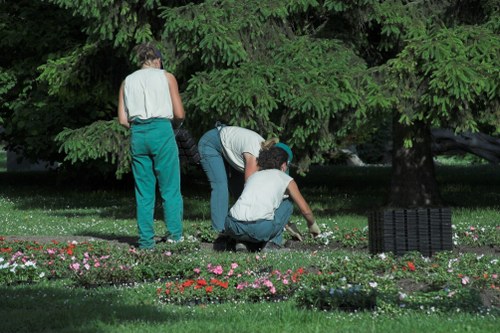
Regular garden maintenance ensures that your plants remain healthy and your garden continues to look its best. Key tasks include:
- Pruning: Removing dead or overgrown branches helps promote healthy growth and improves the plant’s appearance.
- Weeding: Controlling weeds prevents them from competing with your plants for nutrients and water.
- Watering: Proper irrigation is vital, especially during dry spells, to keep plants hydrated without overwatering.
- Fertilizing: Providing essential nutrients supports plant growth and flowering.
- Pest Management: Identifying and controlling pests helps protect your plants from damage.
Seasonal Garden Care in Plaistow
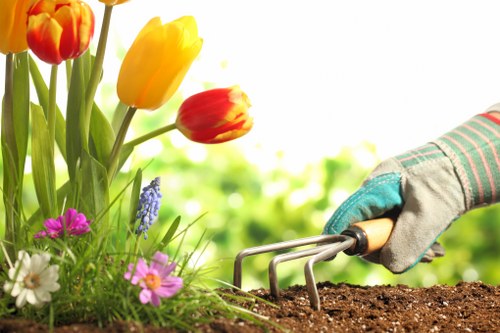
Each season brings unique challenges and opportunities for garden maintenance. Adapting your care routine to the changing seasons can enhance plant health and garden aesthetics.
Spring: Focus on planting new annuals, pruning shrubs, and preparing garden beds. It's also an ideal time for lawn care, including reseeding and fertilizing.
Summer: Regular watering, weeding, and pest control are essential. Deadheading flowers encourages continual blooming, and mulching helps retain soil moisture.
Sustainable Gardening Practices
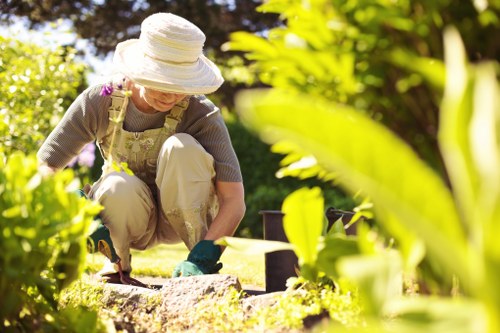
Embracing sustainable gardening practices not only benefits the environment but also promotes a healthier garden. Consider the following approaches:
- Composting: Recycling kitchen and garden waste into compost enriches the soil and reduces the need for chemical fertilizers.
- Rainwater Harvesting: Collecting rainwater for irrigation conserves water and reduces utility bills.
- Native Plants: Planting native species supports local biodiversity and requires less maintenance.
- Organic Pest Control: Utilizing natural predators and organic treatments minimizes chemical usage.
Implementing these practices in your Plaistow garden can lead to a more resilient and eco-friendly landscape.
Choosing the Right Plants for Plaistow
Selecting plants that thrive in Plaistow’s climate and soil conditions is crucial for a successful garden. Consider the following categories:
- Perennials: Plants that return year after year, such as lavender, hostas, and daylilies.
- Annuals: Seasonal favorites like marigolds, petunias, and zinnias that provide vibrant color throughout the growing season.
- Shrubs and Trees: Structural elements like boxwood, hydrangeas, and fruit trees that add height and variety.
- Vegetables and Herbs: Edible plants like tomatoes, basil, and spinach that can be grown in kitchen gardens.
Consulting with local nurseries can provide insights into the best plant varieties suited for Plaistow’s environment.
Tools and Equipment for Effective Garden Maintenance
Having the right tools is essential for efficient garden maintenance. Essential tools include:
- Pruners and Shears: For trimming and shaping plants.
- Garden Fork and Spade: For digging and turning soil.
- Hose and Sprinklers: For watering plants effectively.
- Weeder: To remove unwanted weeds without damaging surrounding plants.
- Gloves: Protect your hands from thorns, dirt, and potential irritants.
Investing in high-quality tools can make garden maintenance tasks easier and more enjoyable.
Lawn Care Tips for Plaistow Gardens
A well-maintained lawn enhances the overall appearance of your garden. Key lawn care practices include:
- Mowing: Regular mowing at the correct height promotes healthy grass growth and prevents weeds.
- Watering: Deep, infrequent watering encourages deep root systems.
- Fertilizing: Providing necessary nutrients during the growing season supports lush, green lawns.
- Aeration: Reducing soil compaction improves air and water penetration to the roots.
- Overseeding: Introducing new grass seed helps fill in bare spots and maintain density.
Consistent lawn care ensures a vibrant and resilient grass cover all year round.
Mulching for Garden Health
Mulching is a fundamental aspect of garden maintenance that offers multiple benefits:
- Moisture Retention: Helps keep the soil moist by reducing evaporation.
- Weed Suppression: Prevents weed growth by blocking sunlight.
- Temperature Regulation: Insulates the soil, keeping it cooler in summer and warmer in winter.
- Soil Enhancement: Organic mulches break down over time, adding nutrients to the soil.
Applying a layer of mulch around your plants can significantly improve their health and reduce maintenance efforts.
Pruning Techniques for Healthy Plants
Proper pruning is essential for maintaining plant health and promoting growth. Here are some pruning tips:
- Remove Dead or Diseased Branches: Prevents the spread of pests and diseases.
- Shape Plants: Enhances the aesthetic appeal by maintaining desired shapes and sizes.
- Encourage New Growth: Stimulates the production of new shoots and flowers.
- Timing: Prune at the appropriate time of year for each plant species to avoid stressing them.
Regular pruning ensures that your plants remain vigorous and visually appealing.
Integrated Pest Management (IPM)
Managing pests effectively is crucial for maintaining a healthy garden. Integrated Pest Management (IPM) combines various strategies to control pests with minimal environmental impact:
- Monitoring: Regularly inspect plants for signs of pests.
- Biological Control: Introduce natural predators like ladybugs and beneficial insects.
- Cultural Practices: Rotate crops and remove plant debris to reduce pest habitats.
- Mechanical Control: Use traps and barriers to keep pests away.
- Chemical Control: Apply pesticides as a last resort, choosing eco-friendly options when necessary.
Implementing IPM techniques helps maintain a balanced ecosystem in your garden, reducing dependency on chemical treatments.
Watering Strategies for Efficient Use
Effective watering is vital for plant health and water conservation. Consider the following strategies:
- Deep Watering: Water deeply and less frequently to encourage deep root growth.
- Early Morning Irrigation: Reduces evaporation and allows plants to dry before evening, preventing fungal diseases.
- Drip Irrigation: Delivers water directly to the plant roots, minimizing waste.
- Rain Barrels: Collect rainwater for irrigation, reducing reliance on municipal water sources.
- Soil Moisture Monitoring: Use moisture sensors to determine when plants need watering.
Adopting these watering techniques ensures your garden receives adequate hydration while conserving water resources.
Maintaining Garden Paths and Structures
Garden paths and structures enhance the functionality and aesthetics of your garden. Regular maintenance includes:
- Weeding: Keep paths clear of weeds to maintain a neat appearance.
- Repairs: Fix any damaged sections of paths, fences, or garden structures promptly.
- Cleaning: Remove debris and moss to prevent slipperiness and deterioration.
- Sealing: Apply sealants to stone or concrete surfaces to protect against weathering.
- Rearranging: Update the layout of garden features to refresh the space.
Well-maintained paths and structures contribute to a cohesive and inviting garden environment.
Choosing the Right Garden Furniture
Garden furniture provides comfort and enhances the usability of your outdoor space. Consider the following when selecting furniture:
- Material: Choose weather-resistant materials like teak, wrought iron, or high-quality plastic.
- Comfort: Opt for ergonomic designs that offer support and relaxation.
- Style: Select furniture that complements your garden’s aesthetic.
- Maintenance: Ensure that the furniture is easy to clean and maintain.
- Durability: Invest in sturdy pieces that can withstand Plaistow’s climate conditions.
Proper selection and maintenance of garden furniture enhance both the functionality and beauty of your garden.
Lighting Your Garden
Garden lighting adds a magical ambiance and extends the usability of your outdoor space into the evening. Key lighting considerations include:
- Functional Lighting: Illuminate pathways and entrances for safety and accessibility.
- Accent Lighting: Highlight garden features such as sculptures, fountains, or specific plants.
- Ambient Lighting: Create a warm and inviting atmosphere with soft, overall lighting.
- Solar Lights: Utilize solar-powered lights for an eco-friendly and cost-effective solution.
- Energy-Efficient Bulbs: Choose LED bulbs to reduce energy consumption and extend bulb life.
Incorporating thoughtful lighting design enhances the beauty and functionality of your garden after dark.
Maintaining Garden Tools
Proper maintenance of garden tools ensures their longevity and performance. Follow these tips:
- Cleaning: Remove dirt and debris after each use to prevent rust and corrosion.
- Sharpening: Regularly sharpen blades and cutting edges for effective performance.
- Storage: Store tools in a dry, organized space to protect them from the elements.
- Repair: Fix or replace damaged parts promptly to extend the life of your tools.
- Lubrication: Apply oil to moving parts to ensure smooth operation.
Maintaining your garden tools not only extends their life but also makes garden maintenance tasks easier and more efficient.
Dealing with Common Garden Pests
Garden pests can cause significant damage if not managed properly. Common pests in Plaistow include:
- Aphids: Small insects that suck sap from plants, leading to stunted growth.
- Slugs and Snails: Mollusks that feed on leaves and stems, leaving unsightly trails.
- Japanese Beetles: Metallic green and copper beetles that feed on a variety of plants.
- Snails: Similar to slugs, they consume plant material and can quickly infest gardens.
- Spider Mites: Tiny arachnids that cause discoloration and leaf drop.
Implementing preventive measures and early intervention strategies can help control pest populations and protect your garden.
Enhancing Garden Biodiversity
Promoting biodiversity in your garden supports a healthy ecosystem and attracts beneficial wildlife. Here’s how:
- Plant Variety: Incorporate a diverse range of plants to provide habitats and food sources for different species.
- Water Sources: Create small ponds or birdbaths to attract birds, insects, and amphibians.
- Bee-Friendly Plants: Grow flowers that attract pollinators like bees and butterflies.
- Habitat Structures: Install birdhouses, bat boxes, and insect hotels to provide safe living spaces.
- Avoid Pesticides: Minimize chemical use to protect beneficial insects and wildlife.
Fostering biodiversity enhances the resilience and beauty of your garden.
Composting and Soil Health
Composting is an eco-friendly way to recycle garden waste and improve soil health. Benefits include:
- Soil Enrichment: Adds essential nutrients to the soil, promoting healthy plant growth.
- Waste Reduction: Minimizes the amount of organic waste sent to landfills.
- Improved Soil Structure: Enhances soil aeration and water retention capabilities.
- Microbial Activity: Encourages beneficial microorganisms that support plant health.
- Cost Savings: Reduces the need for commercial fertilizers and soil conditioners.
Implementing a composting system in your garden is a sustainable practice that benefits both your plants and the environment.
Practical Landscaping Tips
Effective landscaping can transform your garden into a functional and aesthetically pleasing space. Consider these tips:
- Plan Your Layout: Design the garden layout to accommodate plant sizes, sunlight requirements, and aesthetic preferences.
- Create Focal Points: Use features like fountains, sculptures, or striking plants to draw attention.
- Incorporate Layers: Plant in layers with trees, shrubs, and ground covers to add depth and variety.
- Use Hardscaping: Integrate paths, patios, and walls to define spaces and add structure.
- Color Coordination: Choose a color palette that complements your home and creates visual harmony.
Thoughtful landscaping enhances the usability and beauty of your garden, making it a place you can enjoy year-round.
Maintaining Garden Health Through Disease Prevention
Preventing plant diseases is crucial for maintaining a healthy garden. Strategies include:
- Proper Spacing: Ensure adequate spacing between plants to promote air circulation and reduce moisture buildup.
- Sanitation: Remove and dispose of diseased plant material to prevent the spread of pathogens.
- Resistant Varieties: Choose plant varieties that are resistant to common diseases in Plaistow.
- Watering Practices: Water at the base of plants to keep foliage dry and reduce the risk of fungal infections.
- Regular Monitoring: Inspect plants regularly for signs of disease and act promptly if issues arise.
Implementing these prevention measures helps keep your garden thriving and minimizes the impact of diseases.
Creating a Year-Round Garden
A year-round garden provides beauty and interest in every season. Achieve this by:
- Seasonal Planting: Choose plants that bloom in different seasons to ensure continuous color.
- Evergreens: Incorporate evergreen plants to maintain structure and greenery during winter.
- Spring Bulbs: Plant bulbs like tulips and daffodils for early spring displays.
- Autumn Foliage: Select plants with vibrant fall colors, such as maples and ornamental grasses.
- Winter Interest: Add elements like bird feeders, sculptures, and ornamental bark for visual appeal in colder months.
Planning for year-round interest ensures your garden remains a source of enjoyment throughout the entire year.
Hiring Professional Garden Maintenance Services
While DIY garden maintenance is rewarding, sometimes professional assistance is beneficial. Benefits of hiring professionals in Plaistow include:
- Expertise: Professionals bring knowledge and experience to address complex gardening challenges.
- Time-Saving: Outsourcing maintenance tasks frees up your time for other activities.
- Quality Results: Professionals ensure high standards of care, resulting in a well-maintained garden.
- Customized Services: Tailored maintenance plans address the specific needs of your garden.
- Access to Resources: Professionals have access to specialized tools and materials for effective garden care.
Consider hiring a professional garden maintenance service to achieve optimal results and maintain your garden’s health effortlessly.
Conclusion
Effective garden maintenance in Plaistow involves a blend of knowledge, regular care, and sustainable practices. By understanding the local climate, selecting appropriate plants, and implementing essential maintenance tasks, you can cultivate a beautiful and resilient garden.
Whether you choose to manage your garden yourself or enlist professional services, prioritizing garden health and aesthetics will reward you with a thriving outdoor space that enhances your home and provides a serene environment for relaxation and enjoyment.
Contact us today to learn more about our garden maintenance services in Plaistow and take the first step towards transforming your garden into a stunning oasis.